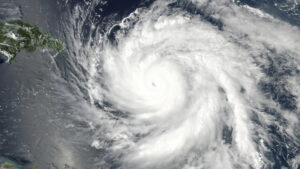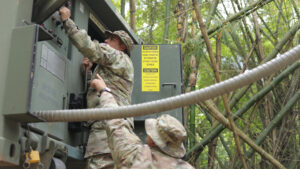It was 5:30 a.m. The cafecito was poured carefully, the aroma of the coffee bean synonymous with dawn. Hands clasped on our mugs, my mother, father, grandfather and I sat in the kitchen, generations gathered under the flickering kitchen light to discuss the day ahead, happy to be together to ring in this new year.
As we began to share what we were looking forward to, the kitchen lights suddenly flickered. Then its glow dissipated. A surge, followed by a hum, which trailed into deafening silence. El apagón. Another blackout. In the thickness of this silence was everything left unsaid by my family. Trembling, sighs of frustration and a sudden rush of anxiety that permeated their faces. They’d seen this before. But not now. Not today. Any day but today.
We shifted to survival mode, moving in synchronicity as we looked for the matches, lit candles, lugged out the generator and trekked out to find gasoline. Assuring each other that everything would be OK. Assuring ourselves that we could make it through yet another blackout.
My family’s story is the story of the millions of Puerto Ricans who have been affected by blackouts since LUMA – a private Canadian-American energy company – assumed control of the island’s electrical grid in 2017 following Hurricane Maria in an effort to privatize the island’s energy resources. Despite promises to develop a robust and effective electrical grid, outages remain frequent, with blackouts disrupting daily life across the island. These outages are not merely inconveniences; they are symptoms of deeply entrenched systemic failures that jeopardize the physical and mental health of Puerto Ricans.

Understandably, the media often focuses on the immediate, tangible effects of blackouts: closed businesses, spoiled food and halted public transportation. And the economic toll of blackouts on the island is nothing short of staggering. Hurricane Maria’s initial economic impact was estimated to be $55 billion. Many small businesses, already struggling in a fragile economy, had to shut down after repeated outages, pushing more families into poverty. This vicious cycle exacerbates the island’s economic precarity; more than 40% of islanders live in poverty.
Underneath these pervasive issues lingers a more insidious burden: the physical and mental health toll on the citizens of Puerto Rico. As a result of blackouts, hospitals scramble to keep lifesaving equipment operational, relying on backup generators that are themselves prone to failure. On an island where many people live with chronic conditions such as cancer, cardiovascular disease and diabetes, blackouts leave citizens fighting for their lives, especially when they are dependent on medicines that need to be refrigerated and lifesaving machines that require electricity.
Blackouts also significantly limit access to clean water and air conditioning, critical to survival in Puerto Rico’s tropical climate. Heat-related illnesses spike during prolonged outages, putting the most vulnerable in Puerto Rico at risk. And more recent research has discovered that increased reliance on diesel generators has exacerbated respiratory conditions like asthma.
Schools without reliable electricity struggle to provide a stable learning environment, leading to academic setbacks and increased feelings of hopelessness among students. Parents, in turn, face mounting stress as they try to maintain routines and provide for their families. For the elderly and those with preexisting mental health conditions, the unpredictability of blackouts exacerbates feelings of isolation and helplessness, creating a dangerous spiral of worsening symptoms.
Each blackout, in effect, is a retraumatization: a frightening reminder of vulnerability and instability. For an island with limited health care resources, this is a recipe for disaster. Left unaddressed, these hidden health crises will only deepen, creating generational cycles of poor health outcomes.

Puerto Rico needs a resilient, sustainable energy system to break free from this cycle. Solar energy offers an opportunity to help Puerto Rico out of the darkness. A 2024 EPA report estimated that solar energy infrastructure could yield as much as $350 million in annual savings for the most vulnerable households in Puerto Rico. Community solar projects, where neighborhoods share resources, have already shown success in towns like Adjuntas, illuminating the possibility of stability and prosperity for Puerto Ricans.
To truly brighten Puerto Rico’s future, the United States government must prioritize modernizing the grid with climate-resilient infrastructure. Though the Biden administration made continued assurances for the implementation of sustainable solar energy, it produced limited results. The Trump administration appears to be walking back any progress made for sustainable infrastructure of the island, effectively eliminating solar and wind energy entirely from its definition of energy. Further, Trump’s recent executive orders aim to rescind Biden’s previous efforts toward sustainable renewable energy in favor of a return to fossil fuels. Puerto Rico cannot sustain policies that will keep it in the dark. It is imperative that the Trump administration attend to and bolster the significant positive impacts solar energy has had on the financial and social well-being of Puerto Rico.
In the meantime, the Puerto Rican government must hold LUMA accountable for its practices and failures. While the Puerto Rico Energy Bureau establishes performance standards for LUMA in order to earn incentives, it does not establish or enforce penalties for substandard practices. Since Hurricane Fiona in 2022, Puerto Rico has endured approximately 232 outages under LUMA’s leadership, exemplifying the company’s unmitigated ineptitude. The Puerto Rican government and the Puerto Rican Energy Bureau must enforce a higher quality of service and performance from LUMA, along with tangible repercussions for when the multi-billion-dollar organization fails to keep its promises.
To be sure, the process for providing stable and resilient energy to improve the quality of life of the Puerto Rican people is multifaceted and will take time. Community members, like my parents and grandfather, have already made significant strides in the stabilization of Puerto Rico through collaboration, ingenuity and resilience. But the spirit of the Puerto Rican people alone cannot withstand an unreliable energy grid.
Eliminating blackouts will do more than keep the lights on; it will flip the switch on Puerto Rico’s cycle of suffering.
Gabriel Cartagena is a bilingual clinical psychologist, assistant professor and leader of the Yale Psycho-Oncology Program at Yale School of Medicine and Smilow Cancer Hospital. He is also an Op-Ed Project Public Voices Fellow.
This article first appeared on Yale Climate Connections and is republished here under a Creative Commons license. Banner photo: Power lines toppled by Hurricane Maria in Puerto Rico (USDAgov, Public domain, via Wikimedia Commons).
Sign up for The Invading Sea newsletter by visiting here. To support The Invading Sea, click here to make a donation. If you are interested in submitting an opinion piece to The Invading Sea, email Editor Nathan Crabbe at nc*****@*au.edu.



